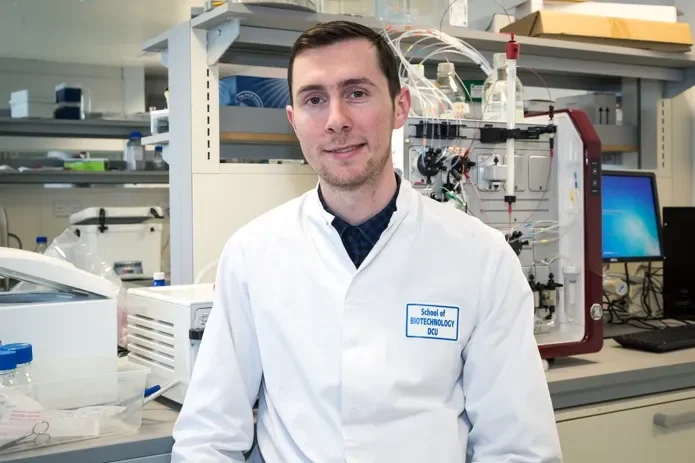

Spotlight on research: A sensor to monitor blooming algae
Spotlight on Research speaks to Dan McPartlin Irish Research Council Scholar and DCU's School of Biotechnology
Dan you are doing a PhD on a new type of sensor to detect algae. Why?
“I’m building part of a sensor system to automatically monitor water in the ocean and help us predict when harmful algal blooms, or HABs are likely to develop.
These overgrowths of algae can produce poisons, or toxins, that get into shellfish such as mussels. Then if humans eat the shellfish, the toxins can make them sick.”
How do we currently figure out if algal blooms are closing in on fisheries?
“Currently people have to go out and collect water samples from the ocean, which are then sent to a lab for testing. That takes time – maybe a turnaround of a couple of days – and you need people to collect and test the water.”
How are you looking to improve that?
“I work with SmartBay Ireland on the MariaBox project, where I’m working on a biosensor that we want to sit out in the ocean on a buoy and monitor the levels of algae and toxins in the water.
The idea is that the monitoring system would take samples and analyse them on the spot, then it would transmit the results back wirelessly so we can keep an eye on the results and predict if a HAB is likely to develop.”
And what part are you working on?
“I’m developing the biosensor component, which uses antibodies. You can tailor these proteins to recognise and bind to specific targets. So in this case I am designing and making them to bind to algae and toxins, which means we can detect them in water samples.
It will be another few years before the full system is ready to be deployed in the ocean, but when it is, the biosensor will be the part that picks up the presence of the algae.”
And how will it help us?
“At the moment it is quite hard to predict when a HAB will develop – lots of factors like water temperature and salinity and weather affect them - but if we are monitoring the ocean water directly, then we will have better data and prediction.
Hopefully that will mean farms can avoid contamination or stop contaminated shellfish getting into the food supply, and that in turn will reduce the human illness.”
As a PhD student, what kind of work do you do?
“Each day is different – I spend a lot of time reading scientific papers in the literature and planning and doing experiments, and also looking back on previous experiments to see how I can build on them.
Thankfully in my group in DCU there is a lot of experience in the area, so we have good chats about how to set up experiments.
There’s a good sense of teamwork in the lab, that’s really positive.”
What do you find challenging about doing a PhD?
“I think that there is a lot of trial and error in science, and you need to motivate yourself to keep going and tweaking the experiments to see how things work.
Doing a PhD requires a lot of perseverance.”
And the rewards?
“I like being able to come up with new ideas, and my supervisor Professor Richard O’Kennedy is very supportive of that.
Then when you are working on those ideas it’s really satisfying to figure out approaches and solve problems. It is great training - I am hopeful that the skills I am developing while doing a PhD will give me options for my future career.”
And how do you find working at DCU?
“It’s brilliant that there are so many institutions of excellence here, like the National Institute for Cellular Biotechnology and the DCU Water Institute, as well as the Nanobioanalytical Research Facility.
These are right on my doorstep and it means I can easily collaborate with experts.”
